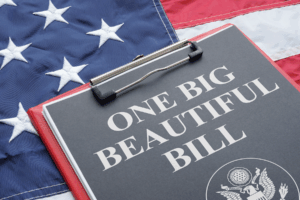Taxing Times Call for Taxing Measures: One Big Beautiful Bill Updates
August 1, 2025
To Inform:

Much has been made of the most recent tax bill that was passed earlier this summer (including Alex Durbin’s take on what it means for the markets, available here.) As many are now aware, the One Big Beautiful Bill Act (OBBB for short) was signed into law by President Trump on July 4th. What we are focused on is the impact of this new tax legislation on the planning and investment aspects surrounding this act and the impact on our clients’ short, intermediate, and long-term goals. From a tax law perspective, much generally remains the same but there are many details included in the act that we want to keep front of mind. Here we take a high-level view of a few of the implications that could affect future planning.
Extension of the Tax Cuts and Jobs Act (TCJA) – with a Boost
Tax Brackets – With much of the 2017 TCJA changes set to expire after 2025, the overwhelming sentiment going into 2025 following the election was that income tax brackets would remain unchanged. This assumption was largely correct with brackets permanently preserved at 10%, 12%, 22%, 24%, 32%, and 37% moving forward. A caveat here, for 2026 only, is that 10% and 12% tax brackets will get a double inflation adjustment, likely pushing the top of the 12% bracket to over $100,000 for those that file as Married Filing Jointly (assuming inflation adjusted at 2% – 2.5% annually).
Standard Deduction – The standard deduction was to be cut in half in 2026 but with OBBB, it will now stay the current more elevated level moving forward. In addition, the standard deduction for 2025 has been increased to $15,750 (previously $15,000) for single filers and $31,500 (previously $30,000) for joint filers. This will be indexed for inflation on an annual basis.
Social Security – Under the OBBB the taxability of social security benefits will be treated just as they are today with up to 85% of benefits being subject to income tax. However, the senior deduction is increasing. For seniors 65 and older both itemizers and non-itemizers may be (with income limitations) eligible to claim up to a $6,000 additional deduction per individual ($12,000 total if both spouses qualify). This is a noticeable increase from the current $2,000 for individuals and $1,600 per person for married individuals. This additional deduction will be helpful for relatively high-earning seniors receiving social security due to likely lowering your overall tax liability, but this is not the same as eliminating federal income tax on social security entirely.
State and Local Taxes (SALT) Deduction – The much discussed and fought over SALT deduction cap has been increased from $10,000 to $40,000 and will be indexed for inflation at 1% through 2029. For those who itemize and pay high state/local income tax and property tax, this increase in deduction will likely have a positive impact on overall tax liability.
These are just a few of the high points included in the Act but there is much, much more included in the OBBB. Your accountant is a great resource to discuss how you may be impacted and, of course, you can reach out to your financial advisor with questions.

Written by Alex Jenney, Wealth Advisory Associate